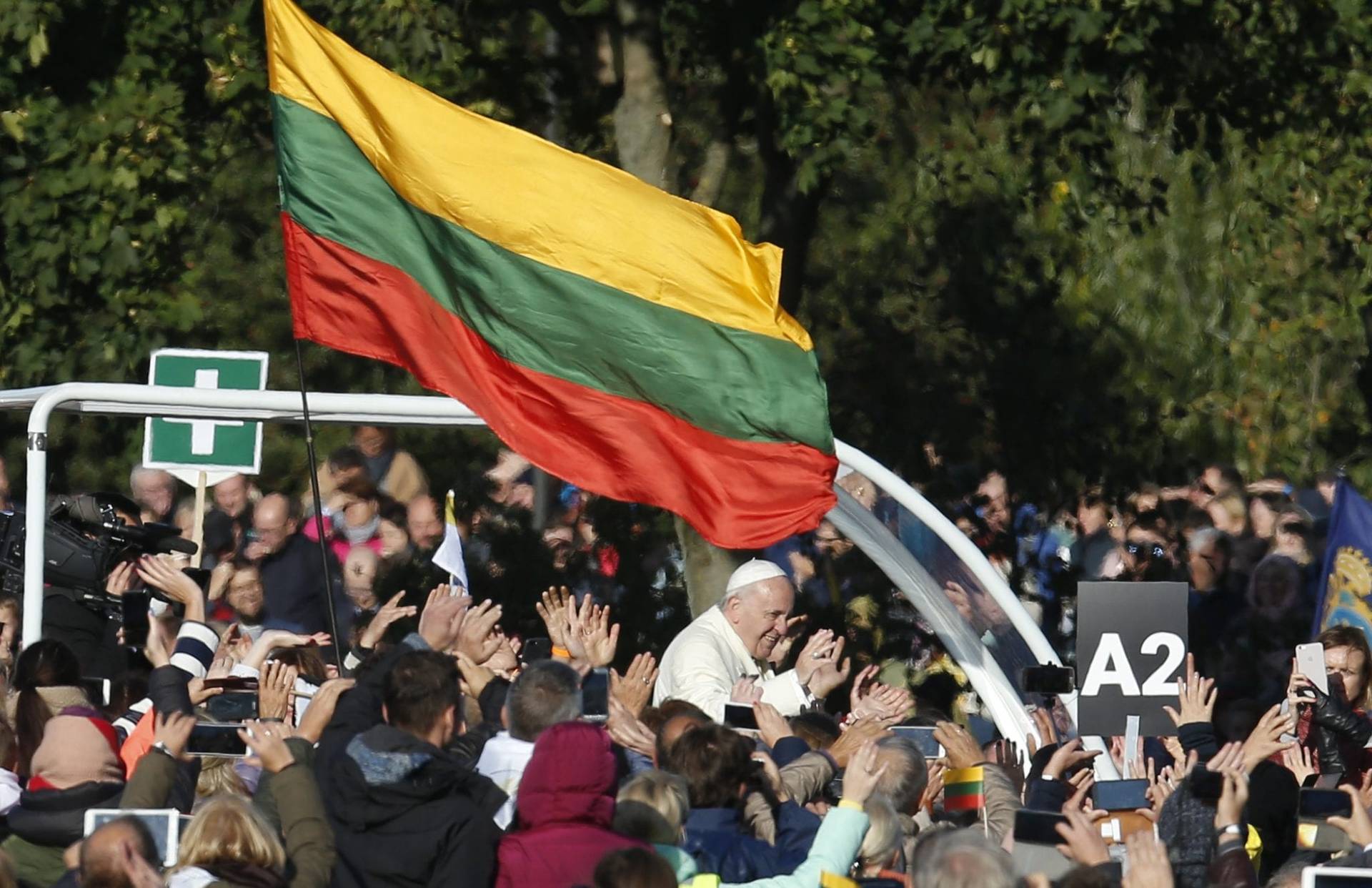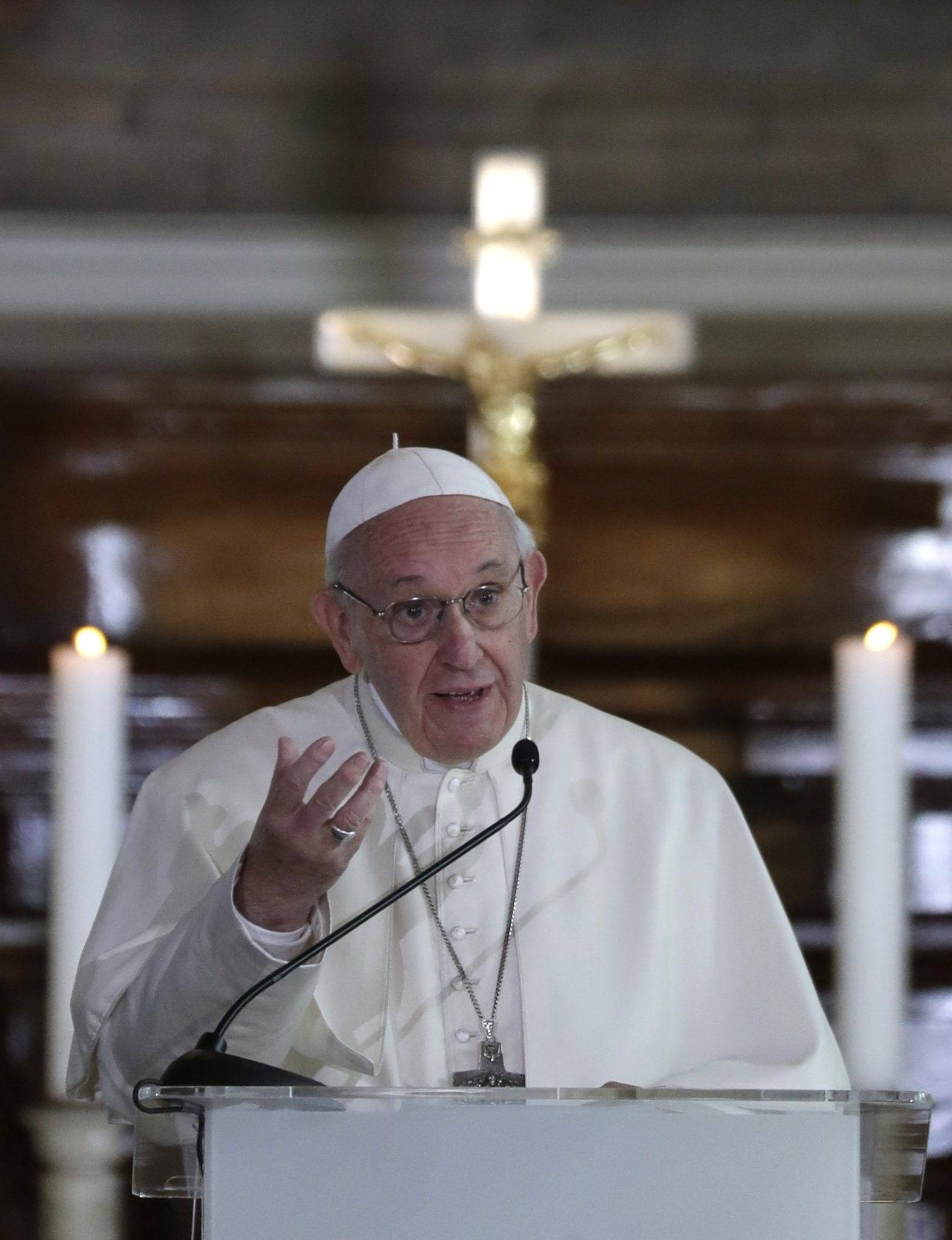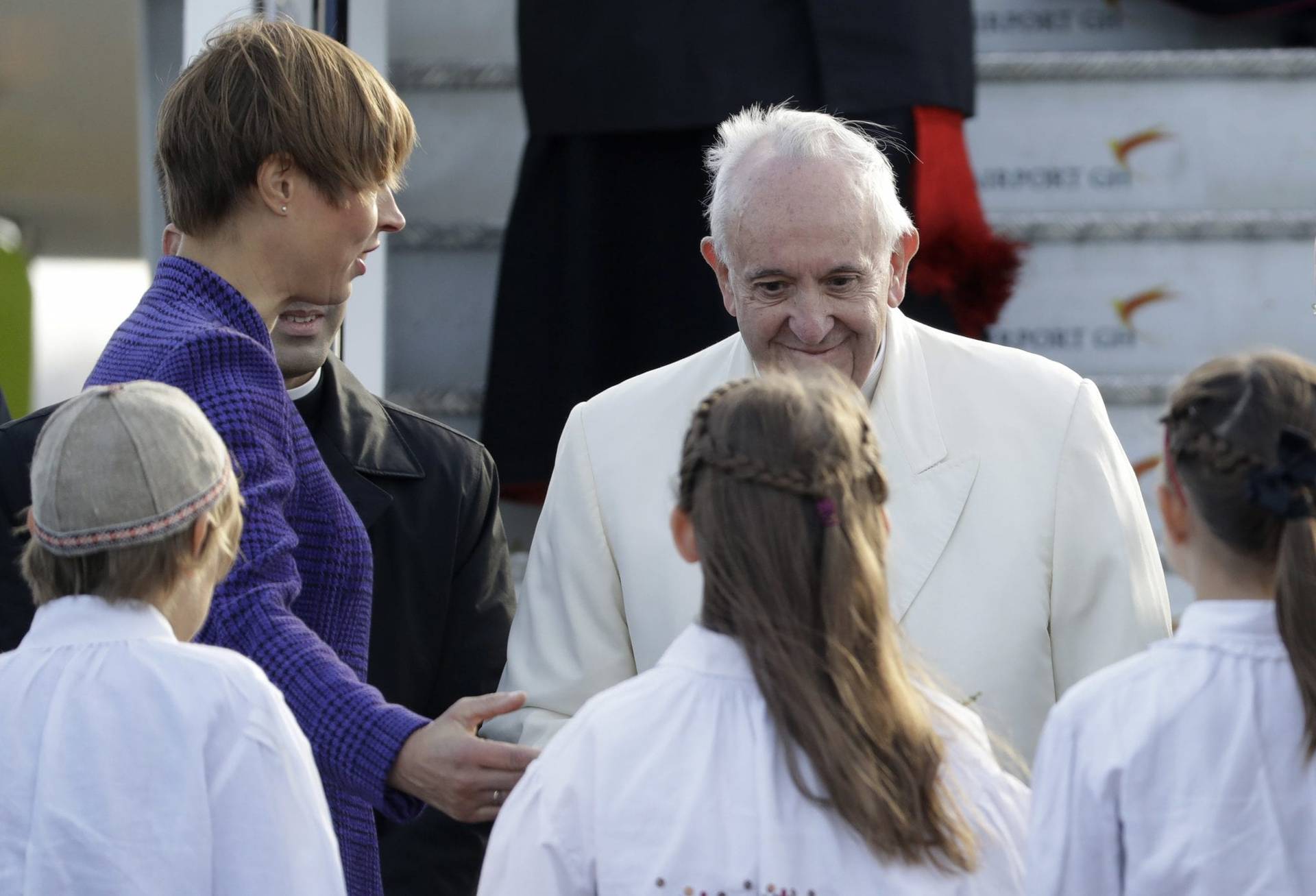ABOARD THE PAPAL PLANE – After largely refusing to take questions on the clerical sexual abuse scandals or anything else unrelated to his four-day trip to the Baltics, Pope Francis during a press conference on Tuesday said that a recent Pennsylvania grand jury report is actually an “example” suggesting the Church is making progress.
That report, which appeared in mid-August, identified more than 300 predator priests over a 70-year span and more than 1,000 child victims. Francis, however, suggested that since the results show fewer cases in recent years, the implication is that the Church’s anti-abuse efforts are working.
“The Church takes an example from Pennsylvania, given the numbers that you see when the Church first became aware of this, and gave it all in recent times,” he said.
Most of the alleged abuse identified by the grand jury occurred during the 1960s, 1970s, and 1980s, although some experts say the lower numbers in recent years may also be due to delays in victims coming forward.
“I think that in Pennsylvania, for example, we see that for the first 70 years many priests had fallen to this corruption [of sexual abuse]. Then in recent times, it diminished because the Church noticed that it had to fight in another way. In previous times things were covered up,” Francis said.
“I see an accusation of the Church. We all know the statistics,” he said. “Even if it was just one priest who abused one boy or girl, it’s monstrous. Because that man was chosen by God to lead the child to heaven.”
Francis also touched on clerical sex abuse when discussing an ecumenical meeting he had with youth during his trip, where he recognized that many young people “are scandalized by the hypocrisy of adults. Are scandalized by wars. They are scandalized by incoherence. They are scandalized by corruption.”
It’s corruption, the pope said, that underlies the question of sexual abuse.
The pontiff also insisted he has never wavered in his commitment to a “zero-tolerance” policy on abuse.
“Never, never have I signed a request for leniency after a sentence has been made,” Pope Francis said while briefly discussing the topic of sexual abuse aboard the papal plane Sep. 25. “There is no negotiating on that.”
The pontiff appeared to be responding to criticism over cases such as Father Mauro Inzoli, an Italian cleric who was removed the priesthood under Pope emeritus Benedict XVI and then reinstated under Francis, only to be dismissed again when he was convicted of sexual abuse by an Italian court.
In the same way as it happened in families, the pope said, where children were at times vulnerable to their uncles or fathers, the culture in the past century was to cover up such abuse because “there was great shame.”
In examining the legacy of the past, the pope suggested, it’s good to adopt the “hermeneutics of the time,” meaning that things that happened in the past should be considered in the context of the time. Francis made the comparison with the colonial mentality toward indigenous people, victims of “many injustices, many brutalities” and also the death penalty.
On this last point, Francis recognized that the Vatican until the late 1800’s committed executions of criminals.
“Then the moral conscience grows,” he said, but added that “always secret ways exist and there are hidden death sentences.” He made the example of elderly people, who often are victims of “a social death sentence today.”
Francis did not specifically address charges by a former papal ambassador in the United States, Italian Archbishop Carlo Maria Viganò, that the pontiff had been informed of sexual misconduct concerns against ex-Cardinal Theodore McCarrick in 2013 and ignored them.
The New China/Vatican Deal
The pope accepted a question on China, given that news of a “preliminary agreement” between the Vatican and the People’s Republic was announced on the first day of Francis’ pastoral visit to the Baltic States Sep. 22-25.
The pope described the deal as the result of a “process that has been going on for years” and born from the work of a Vatican commission, even though the pontiff took on full responsibility for the result.
“You know that when you make a contract, both sides lose something. This is the law and we go ahead. This one went two steps ahead and one back, two ahead and one back,” Francis said. “The issue of the bishops was studied case by case. The dossier of each one of them landed on my desk. I was responsible for signing the case of the bishops.”
“I think of the resistance, of the Catholics who have suffered. It’s true, and they will suffer. Always there is suffering in a deal. But they have a great faith,” Francis said.
“I signed the deal,” he added, “I’m responsible. The others worked for over ten years. This is not an improvisation, it’s a journey.”
The pope also prayed for the suffering of the clandestine Church and for those who don’t understand. Concerning the bishops in China, the pope said that their nomination will be the fruit of a dialogue.
“But the pope nominates them,” he said, “this is clear.”
He also added two anecdotes. The first detailed examples of South America, where bishops were chosen by the rulers of Spain and Portugal for over 300 years, and in the Astro-Hungarian empire where the Church for a long time did not have a say on who its bishops were.
“Thank God this no longer happens,” the pope said.
The second anecdote included the only reference to Viganò during the press conference.
“When there was that famous communique by a former apostolic nuncio [ambassador], the episcopacies of the world wrote to me saying that they felt close and they prayed for me,” the pope said. “The Chinese faithful wrote to me and the signature on this document was by the bishop of, let’s say, the traditional Catholic Church and the bishops of the patriotic Church together, both of them and both faithful.”
“To me this was a sign from God,” Francis added.
The Scandal of the Arms Industry
The pope also took the time to address the issue of the massive military investment in the world, calling it “scandalous,” but also defended the right of a country to protect itself.
“Today global arms sales are scandalous,” the pope said. “It’s terrible. The weapons industry and the black market of weapons is one of the greatest corruptions.”
“Before this issue there is the logic of defense,” Francis said, and he cited how the Biblical figure of David was able to defend himself from Goliath with just a rock and a slingshot.
“But today there are no Davids, and I think that to be safe a country must have a reasonable and non-aggressive defense army. This way the defense is honorable, and it’s an honor to defend the homeland this way.”
The pope mentioned the many frontier wars that continue to lacerate and destroy countries everywhere, especially in Africa. “The arms industry today is scandalous before a starving world,” the pope reiterated.
Baltic States, Immigration and Ecumenism
Francis called the Baltic States of Estonia, Lithuania and Latvia bridges between East and West, powers from both of which in the past have occupied these lands.
“Being bridges requires strength,” the pope said, “a strength of identity. I am aware that the situation in the Baltic States is always in danger. There is fear, deprivation and the history of this place reminds us of it.”
“This is a game that is played day by day, step by step though culture and dialogue,” he added, “it’s not easy and it’s our obligation to be close to you.”
Speaking of the diaspora of many people, especially youth, who left the Baltic countries after the fall of the Soviet Union, Francis recalled his own youth in Argentina and the many Latvians he knew there, who brought with them the wealth of their history and heritage.
“You have an identity that was made in suffering, in defense, in work, in culture. How do you defend identity? You resort to roots, it’s important,” the pope said. “Roots must be transferred to the next generation, with education and dialogue between little old people and youngsters it can be transmitted. You must do it, because your identity is a treasure.”
Francis pointed out how during foreign occupation by Nazi and Soviet forces the elderly in the Baltic States were those who allowed for the culture, language and history to be transmitted to the next generation.
The question of immigration was also addressed by the pontiff, who said that the heads of state of the three countries all brought it up, often citing themes of welcoming and openness.
Francis offered words of caution, stressing that immigration must be looked at case-by-case.
“The theme of immigration in the entire world, not just external immigration but also internal immigration within continents is a serious issue and must be studied. In every country, place and area it has a different connotation.”
Ecumenism, an important theme of the visit, was also discussed by the pontiff who remarked on the widespread peaceful coexistence between the various Churches. “There is a true ecumenism between Lutherans, Baptists, Anglicans and even Orthodox,” the pope said. “It’s a great thing. Brothers, close, one Church.”
The strength and communion of the faiths in Baltics states, he said, is born form the suffering and persecution they endured. While in Lithuania, Francis visited a museum commemorating those killed and tortured by KGB officials because of their ideas or faith and lay flowers on a monument commemorating the genocide of Jews that occurred under Nazi occupation.
“That day, I tell you the truth, I was struck,” the pope admitted. “It made me think about cruelty. And I tell you with the information we have today that cruelty is not over. The same cruelty today can be found in many detention centers. So are many prisons, where overpopulation becomes a form of torture.”
“This is a scandal, a grave scandal of our society,” he added.















